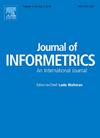A large-scale temporal analysis of scientific production across disciplines and countries
IF 3.5
2区 管理学
Q2 COMPUTER SCIENCE, INTERDISCIPLINARY APPLICATIONS
引用次数: 0
Abstract
In this article, we undertake a comprehensive large-scale analysis of the evolution of scientific communities across different disciplines and countries, spanning the period 1991-2020. Our analysis uses data obtained from Scopus and involves a total of 15,756,144 authors, 74,847,508 publications, and 1,501,206,153 citations. Besides the overall research production, we investigate multiple disciplines at various levels of aggregation (namely, scientific sectors as defined by the European Research Council and Scopus research categories). The geographical focus of our analysis takes into account first the worldwide scientific production and then addresses the 19 countries that are members of the G20 group (thus excluding the EU).
Research production generally increases with time (in terms of authors, publications, and citations), both on a global scale and specifically in each country. The growth is not only in terms of raw numbers but also relative to population and gross domestic product. The gender gap appears to be narrowing, albeit at a slower pace for STEM disciplines than others. Although the United States started out as the dominant country in all research fields, its primacy has eroded constantly with the passage of time. The fastest growing emerging country, China, recently managed to overtake the United States, at least in STEM disciplines.
对各学科和各国科学成果的大规模时间分析
在本文中,我们对1991-2020年期间不同学科和国家的科学界的演变进行了全面的大规模分析。我们的分析使用了来自Scopus的数据,共涉及15,756,144位作者,74,847,508篇出版物和1,501,206,153次引用。除了整体的研究成果,我们还调查了不同级别聚合的多个学科(即由欧洲研究理事会和Scopus研究类别定义的科学部门)。我们分析的地理重点首先考虑了全球的科学生产,然后讨论了20国集团成员的19个国家(因此不包括欧盟)。无论是在全球范围内,还是在每个国家,研究成果通常都会随着时间的推移而增加(就作者、出版物和引用而言)。这种增长不仅体现在原始数据方面,也体现在人口和国内生产总值(gdp)方面。性别差距似乎正在缩小,尽管STEM学科的速度比其他学科慢。虽然美国一开始是所有研究领域的主导国家,但随着时间的推移,它的主导地位不断受到侵蚀。增长最快的新兴国家中国最近成功地超过了美国,至少在STEM学科上是这样。
本文章由计算机程序翻译,如有差异,请以英文原文为准。
求助全文
约1分钟内获得全文
求助全文
来源期刊

Journal of Informetrics
Social Sciences-Library and Information Sciences
CiteScore
6.40
自引率
16.20%
发文量
95
期刊介绍:
Journal of Informetrics (JOI) publishes rigorous high-quality research on quantitative aspects of information science. The main focus of the journal is on topics in bibliometrics, scientometrics, webometrics, patentometrics, altmetrics and research evaluation. Contributions studying informetric problems using methods from other quantitative fields, such as mathematics, statistics, computer science, economics and econometrics, and network science, are especially encouraged. JOI publishes both theoretical and empirical work. In general, case studies, for instance a bibliometric analysis focusing on a specific research field or a specific country, are not considered suitable for publication in JOI, unless they contain innovative methodological elements.
 求助内容:
求助内容: 应助结果提醒方式:
应助结果提醒方式:


